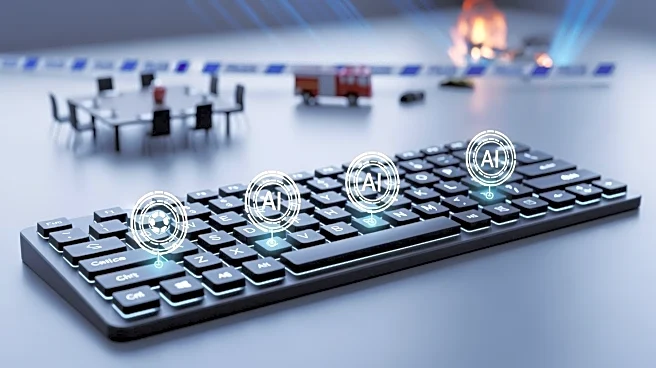What's Happening?
Tech CEOs, including those from Anthropic, Meta, Amazon, Google, and Microsoft, are promoting the use of AI in software development, claiming it can significantly increase productivity by automating code
generation. Anthropic's CEO, Dario Amodei, predicted that AI could soon write 90% of code, while Meta's CEO, Mark Zuckerberg, suggested that AI might handle half of development tasks within a year. Despite these claims, many software engineers remain skeptical, citing challenges such as AI-generated code requiring human oversight and the potential for errors. Engineers like Colton Voege have experienced AI tools as useful for small tasks but not as effective for long-term efficiency gains. Concerns also include the potential replacement of junior coders and the ethical implications of AI's extensive use.
Why It's Important?
The push for AI-driven coding represents a significant shift in the software industry, potentially affecting employment and skill requirements. While AI promises increased efficiency, it also raises concerns about job displacement, particularly for junior engineers. The reliance on AI could alter the traditional pathways for developing coding expertise, impacting the future talent pool. Additionally, the ethical and social implications of AI in coding, such as intellectual property issues and the environmental impact of large models, are critical considerations. The industry's response to these challenges will shape the integration of AI in software development and influence broader technological and economic trends.
What's Next?
As AI tools continue to evolve, companies may need to balance automation with human oversight to ensure quality and ethical standards. The industry might see increased investment in AI training and development, alongside discussions on regulatory frameworks to address ethical concerns. Software engineers and companies will likely explore best practices for integrating AI into workflows, focusing on tasks where AI excels while maintaining human involvement in complex problem-solving. The ongoing dialogue between tech leaders and engineers will be crucial in navigating the future of AI in coding.
Beyond the Headlines
The integration of AI in coding could lead to long-term shifts in the software industry, including changes in educational requirements and career paths. As AI tools become more prevalent, there may be a need for new roles focused on AI oversight and ethical compliance. The cultural impact of AI-driven coding, such as changes in workplace dynamics and the perception of AI as a collaborator rather than a replacement, will also be significant. These developments could influence public policy and societal attitudes towards AI and automation.










